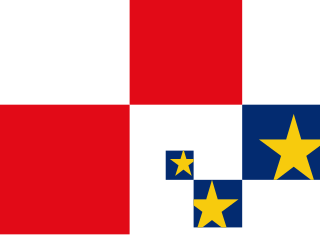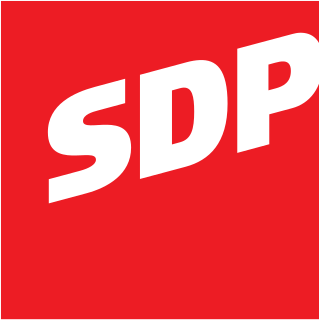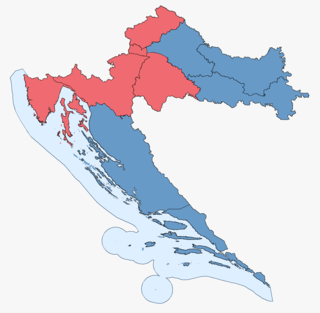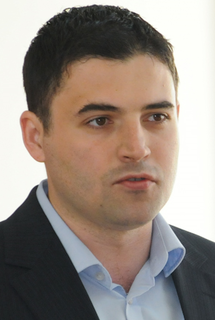| |||||||||||||||||||||||||||||||||||||||||||||||||||||||||||||||||
All 151 seats to Hrvatski sabor 76 seats needed for a majority | |||||||||||||||||||||||||||||||||||||||||||||||||||||||||||||||||
| Opinion polls | |||||||||||||||||||||||||||||||||||||||||||||||||||||||||||||||||
| Turnout | 60.82% | ||||||||||||||||||||||||||||||||||||||||||||||||||||||||||||||||
| |||||||||||||||||||||||||||||||||||||||||||||||||||||||||||||||||
Results of the election in each of the ten electoral districts of Croatia: the party with the plurality of votes in each electoral unit. HDZ: blue (5); SDP: red (5) | |||||||||||||||||||||||||||||||||||||||||||||||||||||||||||||||||
| |||||||||||||||||||||||||||||||||||||||||||||||||||||||||||||||||
| 2003 election • MPs |
| 2007 election • MPs |
| 2011 election • MPs |
| Next election |
Parliamentary elections were held in Croatia on 8 November 2015. [1] All 151 seats in the Parliament were up for election. This parliamentary election was the 8th since the first multi-party election in 1990 and the first since Croatia joined the European Union in 2013. The ruling center-left Croatia is Growing coalition, led by Prime Minister Zoran Milanović, was challenged by the center-right Patriotic Coalition led by the HDZ and headed by its party chairman Tomislav Karamarko, and also faced several new political coalitions.

Croatia, officially the Republic of Croatia, is a country at the crossroads of Central and Southeast Europe, on the Adriatic Sea. It borders Slovenia to the northwest, Hungary to the northeast, Serbia to the east, Bosnia and Herzegovina, and Montenegro to the southeast, sharing a maritime border with Italy. Its capital, Zagreb, forms one of the country's primary subdivisions, along with twenty counties. Croatia has an area of 56,594 square kilometres and a population of 4.28 million, most of whom are Roman Catholics.

The 2013 enlargement of the European Union saw Croatia join the European Union as its 28th member state on 1 July 2013.
Contents
- Background
- Electoral system
- Electoral law amendments
- Political parties
- Opinion polls
- Results
- Distribution of seats by electoral districts
- Government formation
- References
- External links
The elections produced a hung parliament, with the ruling Croatia is Growing coalition winning 56 seats in the 10 electoral constituencies within Croatia and 3 of the 8 representatives of national minorities (Ermina Lekaj-Prljaskaj and Veljko Kajtazi are members of HNS and Sándor Juhász is a member of SDP). The opposition Patriotic Coalition won 56 seats within Croatia and all three seats allocated to Croatian citizens living abroad, winning 59 seats, technically tying with the ruling coalition. The IDS-PGS-RI coalition was expected to side with Croatia is Growing, as well as the remaining 5 minority representatives, giving Prime Minister Milanović's coalition 67 seats to 59 for Karamarko's opposition coalition. This left Milanović 9 seats short of a majority, while Karamarko needed 17 seats.

The Croatian People's Party – Liberal Democrats is a liberal political party in Croatia.

The Social Democratic Party of Croatia is a social-democratic political party and the largest party of the Croatian centre-left. The SDP is one of the two major political parties in Croatia, along with the centre-right Croatian Democratic Union (HDZ).

The Istrian Democratic Assembly is a centre-left, regionalist, liberal political party in Croatia primarily operating in Istria County.
The third-placed MOST led by Metković mayor Božo Petrov, which won 19 seats, was expected to be the deciding factor in the formation of the next government of Croatia. After the election Drago Prgomet of MOST stated that neither Milanović nor Karamarko would be their choice for Prime Minister and that MOST will decide on who will head the 13th government of Croatia. [2] Some within MOST had stated they prefer the formation of a national unity government made up of HDZ, SDP and MOST, though this was considered extremely unlikely. [3] On 11 November Patriotic coalition leader Karamarko openly rejected the prospect of an HDZ-SDP-MOST government. [4] This was followed by more than 45 days of negotiations between all three coalitions.

The Bridge of Independent Lists is a political party in Croatia founded in 2012. The party is led by Božo Petrov, its founder and the former Mayor of Metković and Speaker of the Croatian Parliament from 14 October 2016 to 5 May 2017.

Metković is a town in the Dubrovnik-Neretva County of Croatia, located in the southeast of the country, on the banks of the river Neretva and on the border with Herzegovina.

Božo Petrov is a Croatian politician and psychiatrist who served as the 11th Speaker of the Croatian Parliament since independence, and the 21st Speaker overall, from 14 October 2016 until 4 May 2017. Petrov previously served as the Mayor of Metković and a Deputy Prime Minister in the Cabinet of Tihomir Orešković from 22 January 2016 until his election as Speaker in October 2016. Since 2012 he is the president of the Bridge of Independent Lists party. Petrov resigned his position as Speaker on 4 May 2017, amidst a government and parliamentary crisis. Having held the office for a little over six months Petrov is to date the shortest serving Speaker of Parliament since 1991.
On 22 December it was stated that Croatia is Growing would form a government with MOST, however, on 23 December, MOST decided to give its support to a government with the HDZ. The coalition was further supported by Milan Bandić 365 and two independent minority representatives, giving them a slim majority of 78 seats in Parliament, two more than the required 76 seats. They nominated a Croatian-Canadian businessman named Tihomir Orešković, who was generally unknown to the public and who had spent most of his life in Canada, to be the next Prime Minister. [5] [6] A new government finally took office on 22 January 2016 as with Orešković as the 11th Prime Minister, after a record 76 days of negotiations.

Canada is a country in the northern part of North America. Its ten provinces and three territories extend from the Atlantic to the Pacific and northward into the Arctic Ocean, covering 9.98 million square kilometres, making it the world's second-largest country by total area. Canada's southern border with the United States is the world's longest bi-national land border. Its capital is Ottawa, and its three largest metropolitan areas are Toronto, Montreal, and Vancouver. As a whole, Canada is sparsely populated, the majority of its land area being dominated by forest and tundra. Consequently, its population is highly urbanized, with over 80 percent of its inhabitants concentrated in large and medium-sized cities, many near the southern border. Canada's climate varies widely across its vast area, ranging from arctic weather in the north, to hot summers in the southern regions, with four distinct seasons.



















